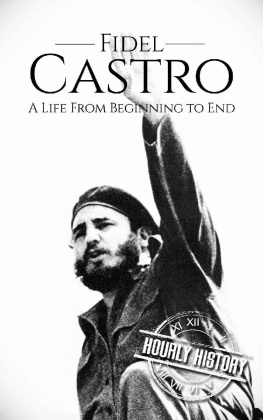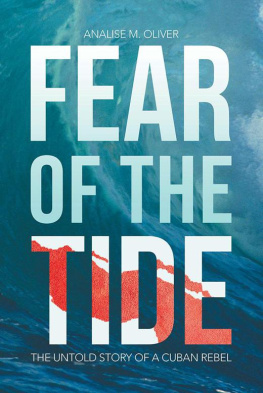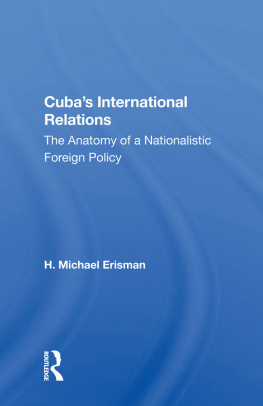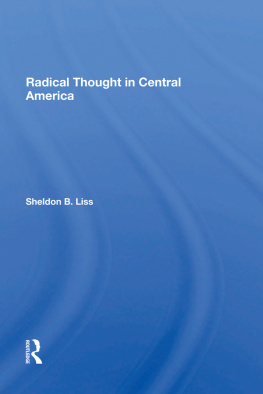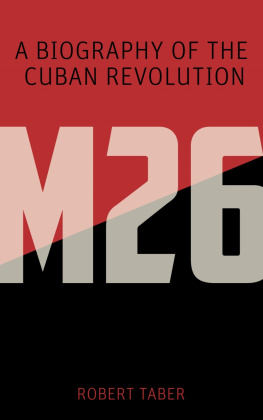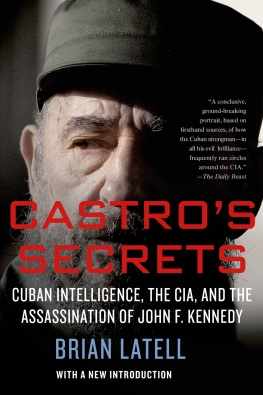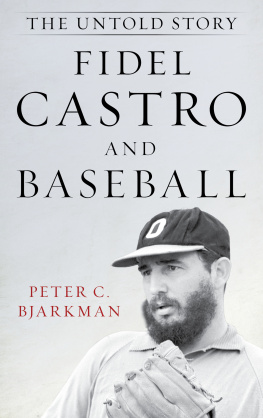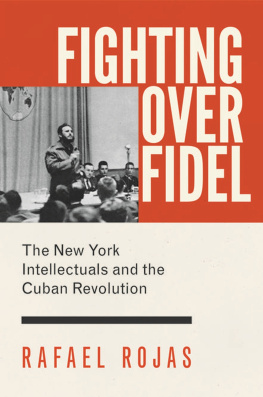Latin American Perspectives Series
Ronald H. Chilcote, Series Editor
Haiti in the World Economy: Class, Race, and Underdevelopment Since 1700, Alex Dupuy
Repression and Resistance: The Struggle for Democracy in Central America, Edelberto Torres-Rivas
The Battle for Guatemala: Rebels, Death Squads, and U.S. Power, Susanne Jonas
Radical Thought in Central America, Sheldon B. Liss
Marxism, Socialism, and Democracy in Latin America, Richard L. Harris
Cuba in Transition: Crisis and Transformation, edited by Sandor Halebsky, John M. Kirk, Carollee Bengelsdorf, Richard L. Harris, Jean Stubbs, and Andrew Zimbalist
The Cuban Revolution into the 1990s: Cuban Perspectives, edited by Centro de Estudios Sobre Amrica
The Latin American Left: Prom the Pall of Allende to Perestroika, edited by Barry Carr and Steve Ellner
In Default: Peasants, the Debt Crisis, and the Agricultural Challenge in Mexico, Marilyn Gates
Fidel! Castros Political and Social Thought, Sheldon B. Liss
Available in hardcover and paperback
Also by Sheldon B. Liss
Radical Thought in Central America (1991)
Roots of Revolution: Radical Thought in Cuba (1987)
Marxist Thought in Latin America (1984)
Diplomacy and Dependency:
Venezuela, the United States and the Americas (1978)
Man, State and Society in Latin American History (coeditor, 1972)
The Canal: Aspects of United States-Panamanian Relations (1967)
A Century of Disagreement: The Chamizal Conflict, 18641964 (1965)
First published 1994 by Westview Press
Published 2018 by Routledge
52 Vanderbilt Avenue, New York, NY 10017
2 Park Square, Milton Park, Abingdon, Oxon OX14 4RN
Routledge is an imprint of the Taylor & Francis Group, an informa business
Copyright 1994 by Sheldon B. Liss
All rights reserved. No part of this book may be reprinted or reproduced or utilised in any form or by any electronic, mechanical, or other means, now known or hereafter invented, including photocopying and recording, or in any information storage or retrieval system, without permission in writing from the publishers.
Notice:
Product or corporate names may be trademarks or registered trademarks, and are used only for identification and explanation without intent to infringe.
Library of Congress Cataloging-in-Publication Data
Liss, Sheldon B.
Fidel! : Castros political and Social thought / Sheldon B. Liss.
p. cm.(Latin American perspectives series ; no. 13)
Includes bibliographical references and index.
ISBN 0-8133-8678-0ISBN 0-8133-8679-9 (pbk.)
1. Castro, Fidel, 1927 . 2. CubaPolitics and
government1959 Philosophy. 3. MarxismCuba. I. Title.
II. Title: Castros political and social thought. III. Series.
F1788.22.C3L57 1994
972.91064dc20
93-32735
CIP
ISBN 13: 978-0-367-01115-4 (hbk)
Over the past three decades Fidel Castro has been the subject of numerous articles and books, most of them polemical in nature. Scholarly objectivity, which is always filtered through an ideological prism, has been rare when writers dealt with the charismatic Cuban leader. Generally, in the United States, journalists, some covertly subsidized by the state, and at times predisposed to sensationalism and character assassination, have done a worse job than academicians in treating Castro fairly. U.S. reporters have tended to conform to the often erroneous and negative attitudes of their government toward Fidel. Their opinions have usually reflected the anticommunism of the advertisers who support their newspapers, magazines, and radio and television stations and who indirectly pay their salaries. One perspicacious student of Cuba pointed out that among academicians once a view about how to properly study a subject is accepted as objective, it rules the field. Those who reject it are pushed to the periphery of the discipline and often considered radical, too ideological, or nave by those who follow the official paradigm.
To understand Fidel Castro one must comprehend the history of Cuba and Latin America as well as the philosophical underpinnings of Marxism and Leninism. Many people in the United States who write about Cuba have some comprehension of the countrys history and can place it in a Latin American context, but few understand Marxism and Leninism, nor are they sufficiendy flexible to even accept its democratic and egalitarian aspects. Thus the majority, including liberal academics, tend to analyze Fidel from a cold war, anti-Marxist perspective.
What follows is not a biography, nor an account of how Castro came to power, a tale told often and well by others. It is not a history of Cubas Communist party, a book on revolutionary strategy, or a text on guerrilla warfare. This volume examines Fidels endeavors to build socialism in Cuba, but it is not a theoretical tract. Cuban Marxism, as we shall see, is more a product of the political and social thought and praxis of Fidel Castro than a defined doctrine. This book enhances understanding of the Cuban Revolution by viewing it through the political and social thought of its primary motivator.
The creative spirit for the Revolution has, to a great degree, emanated from Fidels intuitively radical beliefs, many of them predicated upon Cubas historical reality. I approach the Revolution as a historical process and explore the role of its central figure in Cubas revolutionary theory and practice.
This volume lets Castro explain his vision of Cuban Marxism and does not evaluate the Revolution by employing a scholarly model. Occasionally, I refer to established typologies that Fidels ideas happen to fit. I also realize that political, social, and economic exigencies have often forced Cubas leader to change his views.
I started collecting material for this study in 1977 when preparing a section on Castro for my Marxist Thought in Latin America , and I acquired additional data on a 19811982 research trip to Cuba while working on Roots of Revolution: Radical Thought in Cuba. Numerous documents collected and interviews conducted in Cuba in 1992 helped to clarify my thinking. Over the years, I have waded through thousands of speeches, transcripts, articles, and essays by and about Fidel and have reviewed dozens of interviews with him by individuals representing diverse ideologies. No act of Castros goes unrecorded. Whenever he breathes, someone measures the oxygen count. Some remarks attributed to Fidel might have been written by others, although he approves just about everything that goes out over his name.
Fidel Castro, like Karl Marx, has never tried to formulate a comprehensive philosophical or historical system explaining everything. This book is not designed to show that his ideas constitute a coherent whole but to illustrate how they have been affected by, adapted from, and organized according to diverse Marxist beliefs and how they have been applied practically in Cuba. The book explores three decades of Castros thought and touches the most salient aspects of Cuban life under the Revolution. The emphasis is on political and social thought, with the understanding that political economy is central to Cuban thinking.


